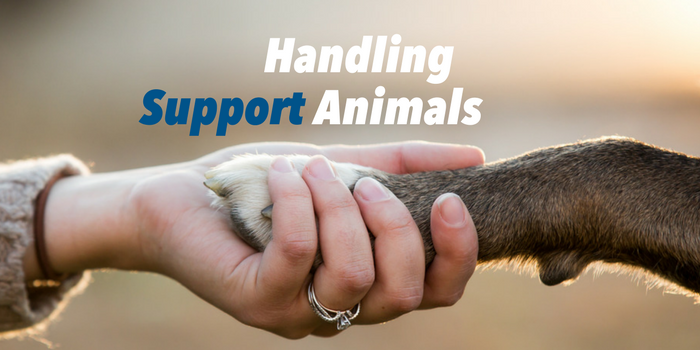What do turkeys, monkeys, pigs, and ducks all have in common? Believe it or not, all of these animals have been in the news lately for joining their owners on airplanes as emotional support animals. While we’re not downplaying the importance of emotional support animals for their owners, today we’re highlighting a hot topic in today’s culture and how it can impact your HOA.
HOAs have varying pet policies, ranging from no pets, to bans on certain breeds of pet, or limits on size, weight, or total number of pets in each unit. But any of these policies can be called into question when an owner requests a service or emotional support animal. The Fair Housing Act (FHA) says, “A landlord or homeowner’s association must provide reasonable accommodation to people with disabilities so that they have an equal opportunity to enjoy and use a dwelling…an individual with a disability who requests a reasonable accommodation may be asked to provide documentation so that the landlord or homeowners association can properly review the accommodation request.”
How This Applies to Your HOA
If any unusual animals that fall outside of your HOA’s guidelines move into your community, here are a few tips for handling the situation:
- A request for proof of a disability-related need is allowed if the disability is not apparent. The FHA defines disability as, “A physical or mental impairment that substantially limits one or more major life activities”. It doesn’t have to be obvious or apparent, and therefore asking for a certain amount of clarification is allowed.
- You are entitled to ask for a statement from a health care provider that confirms the need.
- The individual requesting the support animal should never be asked to share specific information about their disability. If such information is voluntarily given, it should never be shared with anyone outside of the board.
- If another resident questions why one person has an animal but their request was denied, simply respond that a request for reasonable accommodation was granted, but do not give any other information.
- As a board, it’s probably a good idea to create a procedure for reviewing requests for service animals. You may want to involve your legal team, but when considering these requests, also try to be reasonable.
- You should follow the guidelines set by the U.S. Department of Housing and Urban Development. The HOA board is allowed to ask for some background information to assess whether or not the request for a service, assistance, or support animal is reasonable in each situation. When you receive the initial request, consider granting temporary or conditional approval (when reasonable) until you’ve followed all necessary steps to determine whether the request is valid or not.
- Monthly pet fees cannot be charged for any service animals. However, any damage caused to the property by the animal can be charged to the owner. If the animal acts threateningly toward other residents, you are not required to allow a dangerous animal to live in your community.
Unfortunately, there are situations where an individual may claim the need for emotional support when no need exists, or may claim the need only after the HOA finds out about an unapproved animal and is trying to impose penalties. Because the lines are so blurry, always consult your legal team before making decisions in situations like these. This is another reason why it’s good to have procedures and policies in place before the situations arise.
For additional questions about HOA management contact Spectrum Association Management today and see what makes us refreshingly different from other HOA management companies.







